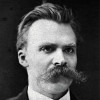“ How is it that man, who as a reality is so estimable, ceases from deserving respect the moment he begins to desire? Must he pay for being so perfect as a reality? ”
Friedrich Nietzsche, Twilight of the Idols (1889). copy citation
| Author | Friedrich Nietzsche |
|---|---|
| Source | Twilight of the Idols |
| Topic | reality desire |
| Date | 1889 |
| Language | English |
| Reference | |
| Note | Translated by Anthony M. Ludovici |
| Weblink | https://www.gutenberg.org/files/52263/52263-h/52263-h.htm |
Context
“If a philosopher could be a nihilist, he would be one; for he finds only nonentity behind all human ideals. Or, not even nonentity, but vileness, absurdity, sickness, cowardice, fatigue and all sorts of dregs from out the quaffed goblets of his life.... How is it that man, who as a reality is so estimable, ceases from deserving respect the moment he begins to desire? Must he pay for being so perfect as a reality? Must he make up for his deeds, for the tension of spirit and will which underlies all his deeds, by an eclipse of his powers in matters of the imagination and in absurdity? Hitherto the history of his desires has been the partie honteuse of mankind:”
source



